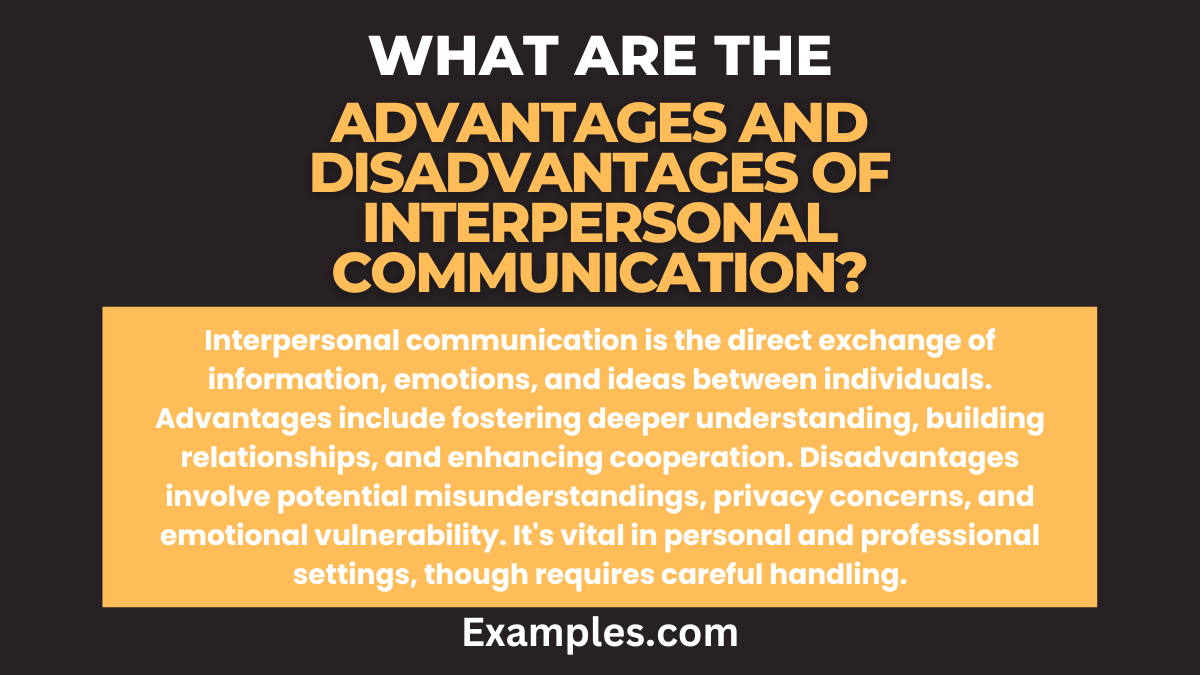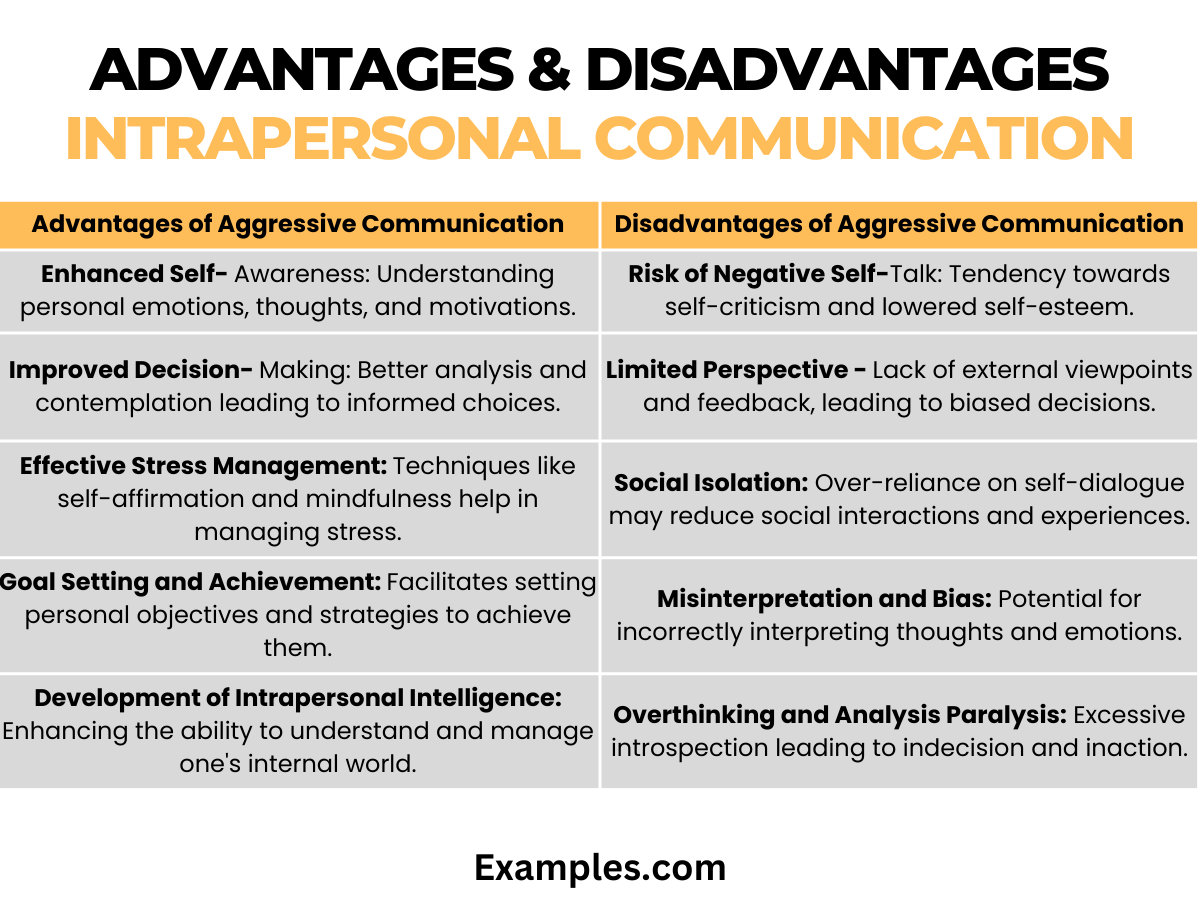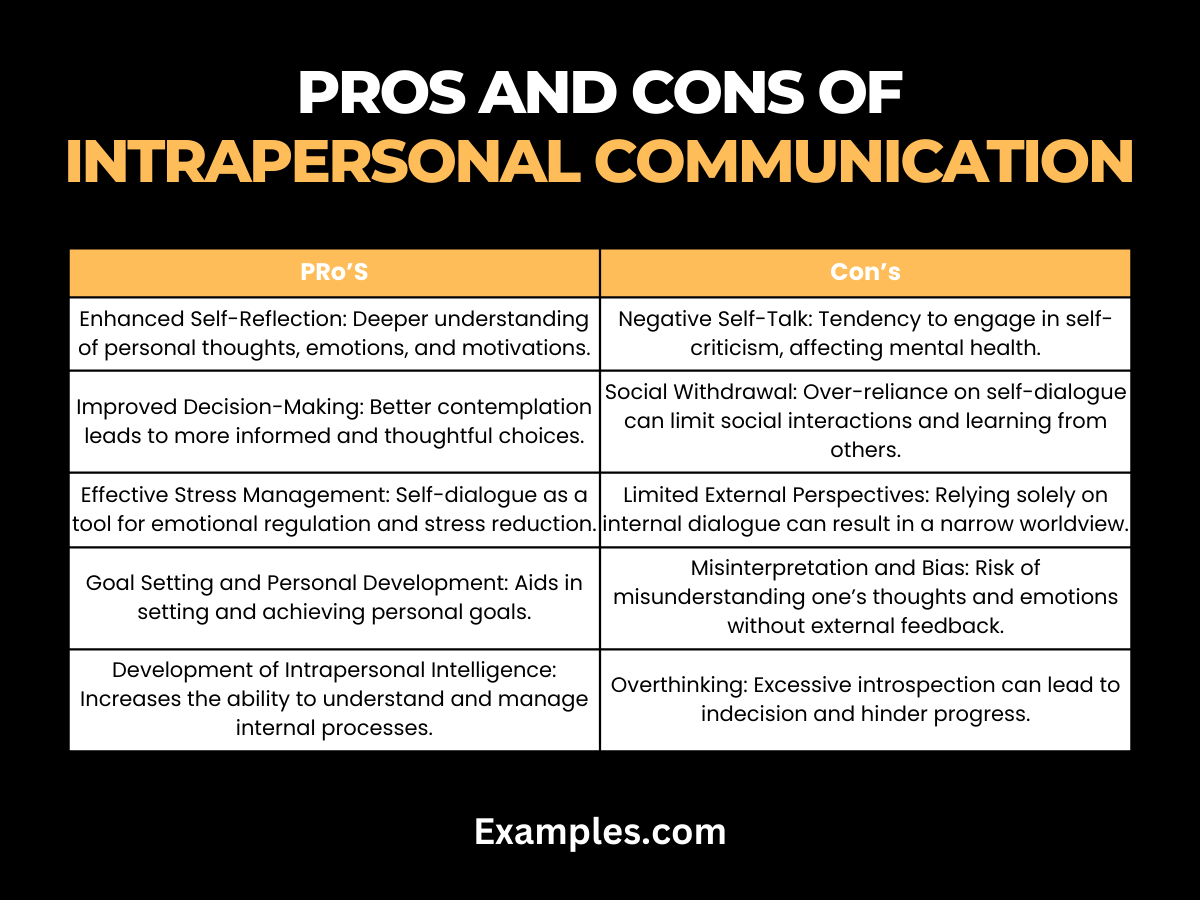Advantages and Disadvantages of Intrapersonal Communication
In the realm of personal development, Intrapersonal Communication plays a pivotal role. This complete guide explores the numerous advantages and challenges associated with internal dialogue. We’ll delve into real-life Intrapersonal Communication Examples, highlighting how this form of self-talk influences decision-making, emotional well-being, and personal growth. Understanding both sides of intrapersonal communication equips you with the tools for better self-awareness and effective problem-solving in everyday life.
What are the Advantages and Disadvantages of Interpersonal Communication?

Interpersonal communication refers to the exchange of information, thoughts, and feelings between two or more people through verbal or non-verbal methods. It’s a fundamental aspect of human interaction, playing a crucial role in building relationships, conveying ideas, and understanding others. This form of communication encompasses various types, including face-to-face conversations, phone calls, and group discussions. Effective interpersonal communication requires skills like active listening, empathy, and clarity. Understanding its advantages and disadvantages is essential for personal and professional success, impacting areas such as Intrapersonal Communication Skills and Social Penetration Theory.
Advantages and Disadvantages of Intrapersonal Communication

Intrapersonal Communication, an essential aspect of our internal cognitive processes, significantly impacts our daily lives. This guide explores the advantages and disadvantages of this self-communication, integrating related concepts and theories for a comprehensive understanding.
| Advantages of Intrapersonal Communication | Disadvantages of Intrapersonal Communication |
|---|---|
| Enhanced Self-Awareness: Understanding personal emotions, thoughts, and motivations. | Risk of Negative Self-Talk: Tendency towards self-criticism and lowered self-esteem. |
| Improved Decision-Making: Better analysis and contemplation leading to informed choices. | Limited Perspective: Lack of external viewpoints and feedback, leading to biased decisions. |
| Effective Stress Management: Techniques like self-affirmation and mindfulness help in managing stress. | Social Isolation: Over-reliance on self-dialogue may reduce social interactions and experiences. |
| Goal Setting and Achievement: Facilitates setting personal objectives and strategies to achieve them. | Misinterpretation and Bias: Potential for incorrectly interpreting thoughts and emotions. |
| Development of Intrapersonal Intelligence: Enhancing the ability to understand and manage one’s internal world. | Overthinking and Analysis Paralysis: Excessive introspection leading to indecision and inaction. |
Advantages of Intrapersonal Communication
- Enhances Self-Awareness: Regular Intrapersonal Communication helps in understanding personal traits and emotions, an aspect highlighted in Intrapersonal Communication Theories like the Johari Window Model.
- Improves Decision-Making: This form of communication involves reflecting on various Intrapersonal Communication Examples, aiding in making well-thought-out decisions.
- Boosts Problem-Solving Skills: Skills developed through intrapersonal communication are essential in resolving life challenges, aligning with Intrapersonal Communication Skills.
- Facilitates Goal Setting and Achievement: Reflecting on one’s aspirations, a key element of Intrapersonal Communication Activities, helps in setting realistic goals and working towards them.
- Reduces Stress and Anxiety: Effective intrapersonal communication can act as a mechanism for emotional regulation, as suggested by Cognitive Dissonance Theory.
Disadvantages of Intrapersonal Communication
- Risk of Negative Self-Talk: Overemphasis on self-dialogue can lead to detrimental self-criticism, contrary to the positive aspects highlighted in Intrapersonal Communication Concepts.
- Limited Perspective: Sole reliance on internal dialogue can limit exposure to new ideas, a point often discussed in Intrapersonal Communication Models.
- Social Isolation: Excessive inward communication can impact Interpersonal Communication, leading to reduced social interactions and potential isolation.
- Possibility of Misinterpretation: Internal biases may distort reality, a concern addressed in various Intrapersonal Communication Theories.
- Overthinking and Indecisiveness: Too much introspection might lead to overthinking, hindering decisive action, a situation often explained in Intrapersonal Communication Studies.
In summary, while Intrapersonal Communication offers numerous benefits like improved self-awareness and decision-making, it also has drawbacks such as the potential for negative self-talk and social isolation. Understanding and balancing these aspects, as recommended in Intrapersonal Communication Literature, are crucial for personal and professional development.
Advantages and Disadvantages of Intrapersonal Communication Essay
In this detailed essay, we will explore the multifaceted nature of Intrapersonal Communication, discussing its advantages and disadvantages. This form of communication, which primarily involves an individual’s internal thought processes and self-reflection, plays a critical role in personal development and emotional well-being.
Advantages of Intrapersonal Communication
- Self-Understanding and Growth: Intrapersonal communication is instrumental in fostering self-awareness. It enables individuals to introspect, understand their emotions and thoughts, leading to personal growth and development. This aspect aligns with the Self-Discrepancy Theory, which emphasizes understanding self-concepts.
- Enhanced Decision-Making Abilities: By engaging in internal dialogues, individuals can weigh their options carefully, leading to better decision-making. This process is influenced by various Intrapersonal Communication Theories that shed light on cognitive processing.
- Stress Management and Emotional Regulation: Regular self-reflection helps in managing stress and regulating emotions effectively. Techniques in Intrapersonal Communication Activities like journaling or meditation can be particularly beneficial.
- Development of Personal Goals: Setting and achieving personal goals is facilitated by a clear understanding of one’s aspirations and limitations, a process central to intrapersonal communication.
- Cultivation of Intrapersonal Intelligence: As highlighted in Intrapersonal Intelligence Examples, this form of communication aids in developing intrapersonal intelligence, which is crucial for understanding oneself and navigating life’s challenges.
Disadvantages of Intrapersonal Communication
- Risk of Negative Self-Talk: One significant drawback is the tendency to engage in negative self-talk, which can lead to issues like low self-esteem and depression, as discussed in Intrapersonal Communication Studies.
- Limited Perspective and Bias: Solely relying on internal dialogue can lead to a limited perspective, as it lacks external viewpoints and feedback, a concern outlined in Intrapersonal Communication Models.
- Potential for Social Isolation: Over-reliance on self-communication may reduce the desire or ability to engage in Interpersonal Communication, leading to social isolation.
- Difficulty in Externalizing Thoughts: Some individuals might struggle to externalize and communicate their internal thoughts effectively, impacting their interpersonal relationships and professional life.
- Overthinking and Paralysis by Analysis: Excessive introspection can sometimes lead to overthinking, causing indecisiveness and inaction, as noted in various Intrapersonal Communication Concepts.
In conclusion, this essay underscores the significance of understanding the advantages and disadvantages of Intrapersonal Communication. While it offers profound benefits like self-awareness and improved decision-making, it also poses challenges like potential negative self-talk and social isolation. Balancing intrapersonal and interpersonal communication is key to harnessing the positives while mitigating the negatives, thus achieving a well-rounded communicative competence.
Pros and Cons of Intrapersonal Communication
Intrapersonal communication, the internal dialogue and reflection we engage in with ourselves, is a fundamental aspect of our daily lives. This comprehensive guide aims to provide an in-depth look at the pros and cons of intrapersonal communication, offering insights into how it shapes our thoughts, behaviors, and overall well-being.

| Pros of Intrapersonal Communication | Cons of Intrapersonal Communication |
|---|---|
| Enhanced Self-Reflection: Deeper understanding of personal thoughts, emotions, and motivations. | Negative Self-Talk: Tendency to engage in self-criticism, affecting mental health. |
| Improved Decision-Making: Better contemplation leads to more informed and thoughtful choices. | Social Withdrawal: Over-reliance on self-dialogue can limit social interactions and learning from others. |
| Effective Stress Management: Self-dialogue as a tool for emotional regulation and stress reduction. | Limited External Perspectives: Relying solely on internal dialogue can result in a narrow worldview. |
| Goal Setting and Personal Development: Aids in setting and achieving personal goals. | Misinterpretation and Bias: Risk of misunderstanding one’s thoughts and emotions without external feedback. |
| Development of Intrapersonal Intelligence: Increases the ability to understand and manage internal processes. | Overthinking: Excessive introspection can lead to indecision and hinder progress. |
Pros of Intrapersonal Communication
- Enhanced Self-Reflection and Awareness: Regular intrapersonal communication allows for deeper self-reflection, leading to increased self-awareness. It enables individuals to understand their thoughts, emotions, and motivations more clearly.
- Improved Decision-Making Skills: By internally deliberating on various options and outcomes, intrapersonal communication aids in making more informed and thoughtful decisions, a concept supported by Intrapersonal Communication Theories.
- Effective Stress Management: Engaging in self-dialogue can be a powerful tool for managing stress and emotional regulation. Techniques like mindfulness and self-affirmation fall under this category, as they help in calming the mind and reducing anxiety.
- Goal Setting and Personal Development: Intrapersonal communication is key to setting personal goals and strategizing on how to achieve them. It encourages a proactive approach to personal development and self-improvement.
- Cultivation of Intrapersonal Intelligence: Developing intrapersonal intelligence is a significant advantage, as it enhances one’s ability to understand and manage their internal world effectively.
Cons of Intrapersonal Communication
- Tendency Towards Negative Self-Talk: One of the major cons is the propensity to engage in negative self-talk, which can lead to a decrease in self-esteem and overall mental health.
- Risk of Becoming Overly Introverted: Excessive reliance on intrapersonal communication can sometimes lead to social withdrawal, limiting opportunities for interpersonal interactions and experiences.
- Limited External Perspectives: Solely focusing on internal dialogue may result in a narrow perspective, as it lacks the breadth of insights and feedback that come from external sources.
- Potential for Misinterpretation and Bias: Without external input, there’s a risk of misinterpreting one’s own thoughts and emotions, leading to biased conclusions and decisions.
- Overthinking and Analysis Paralysis: Intrapersonal communication can sometimes lead to overthinking, causing indecision and inaction, which can hinder personal and professional progress.
In summary, the pros and cons of intrapersonal communication highlight the importance of this internal dialogue in our lives. While it offers significant benefits in terms of self-awareness and decision-making, it also poses challenges like negative self-talk and limited external perspectives. Balancing intrapersonal communication with interpersonal interactions is crucial for a well-rounded and healthy approach to communication and personal development.
In conclusion, understanding the advantages and disadvantages of intrapersonal communication is crucial for personal and professional growth. This guide has explored how effective self-dialogue can enhance decision-making and self-awareness, while also cautioning against its potential pitfalls such as negative self-talk and social isolation. Embracing a balanced approach is key to harnessing the power of intrapersonal communication effectively.



